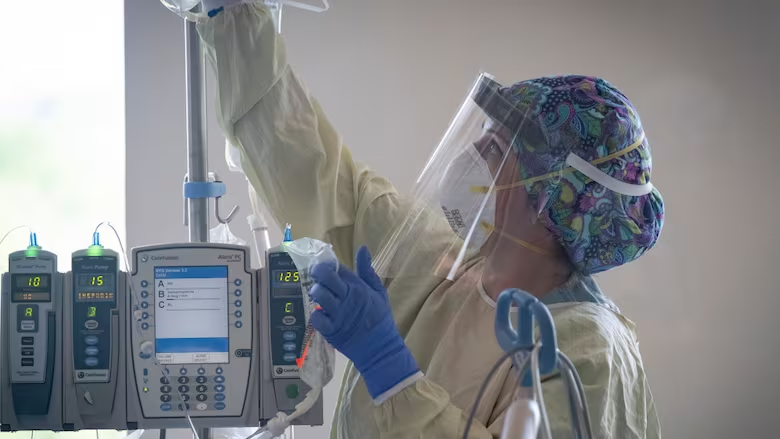Hospitals see influx of children with COVID-19 as Alberta battles 5th wave
43 of the 1,007 infected patients in the province are under the age of 18

As Omicron cases surge in Alberta, so does the number of children hospitalized with COVID-19.
According to Alberta Health, 43 of the 1,007 COVID patients in hospital Monday were under the age of 18. That included eight who were in intensive care.
Those figures are up from last Friday, when 30 youngsters were hospitalized and four were in the ICU.
And it's at least double the number seen in previous waves, according to Dr. Jim Kellner, pediatric infectious disease specialist at Alberta Children's Hospital.
"We have more children in hospital now than with any of the previous waves," said Kellner, who also teaches in the Cumming School of Medicine at the University of Calgary.
For example, in mid-October during the Delta-driven fourth wave, 16 of the 1,053 people hospitalized for COVID-19 were children, including four in ICU.
"Its probably related to the very large number of people getting COVID in the community, and still a small percentage of all cases end up having to be hospitalized," he said.
Death of a child
The rising hospitalizations are punctuated by the COVID-related death of another child, included in Monday's COVID-19 update. This is the fifth reported death of someone under 19 since the start of the pandemic.
The province originally reported the child was between five and nine years old and had no underlying health conditions. However, on Tuesday, a spokesperson said the child did have pre-existing health conditions.
The death is tragic, Kellner said.
But he noted the vast majority of infected children still experience mild illness.
"Fortunately, the likelihood of dying of COVID-19 as a child remains many, many times less likely than in an adult. And that hasn't changed around the world. Children are less likely to be admitted to hospital … in Alberta, [roughly] one-10th as likely to be admitted to hospital or end up on an intensive care unit — but far less likely to pass away from COVID-19, fortunately."

Sharp rise in ER visits
In the emergency room at Alberta Children's Hospital, Dr. Stephen Freedman is seeing a dramatic increase in children with COVID-19.
In previous waves, he said, the ER would have four or five kids test positive per day, despite testing all children who showed up with COVID symptoms.
During the first few weeks of January, that spiked to roughly 35 cases per day.
Freedman, who also teaches in the Cumming School of Medicine, said for capacity reasons the hospital recently shifted away from testing all symptomatic children. It now focuses on testing only those for whom having a firm diagnosis will affect their treatment.
Even still, the hospital's case numbers are still double or triple what doctors saw in previous waves.
"I don't think there's been a real change or shift in the severity of illness," said Freedman.
Impacting children differently
What is new, according to Freedman, is Omicron is affecting many children differently than earlier variants because it appears to attack the upper airways more than the lungs.
"Right now, we are seeing a large number of children with croup who are actually testing positive for COVID."
Croup, which is a common childhood illness, is usually triggered by another virus called parainfluenza. It causes upper airway inflammation and leaves children with a dry, barking cough.
"In the young kids, that can lead to difficulties with breathing. And so we are having to treat that in the emergency department as we typically would with croup caused by other viruses that we often see at this time of year," he said.
According to Freedman, most children can be treated with a dose of steroids in the ER, but some — with more severe cases — do have to be admitted for treatment to settle their breathing.
"In the early days when children were infected with COVID, with the other variants, we rarely, if ever, saw croup as a presentation," Freedman said.
Meanwhile, Freedman said it is unclear exactly how many of the overall pediatric hospitalizations are children being treated for a COVID infection, how many have an underlying illness exacerbated by COVID, how many are there for other reasons and how many are there for other reasons and test positive incidentally.
Alberta Heath has said it is working to provide an on-going breakdown of its hospitalization numbers.
Regardless, with such widespread transmission, it's expected more children will end up hospitalized in the coming weeks. Freedman is urging parents to take precautions, including getting all children five and up vaccinated.
"The good news is the vast majority of children don't require hospitalization," said Freedman.
"However, if children are sick enough to be requiring hospitalization due to COVID, the risks are not insignificant as there is a high likelihood of requiring intensive care unit admission. And of that, if that ultimately is required, there is still a significant mortality rate associated with COVID in children who are sick enough to need ICU care."
Corrections
- In the original version of this story, it was reported that a child who recently died of COVID-19 had no underlying health conditions. Alberta Health issued a correction on Jan. 18 stating the child did have pre-existing health conditions.Jan 18, 2022 6:40 PM EST

